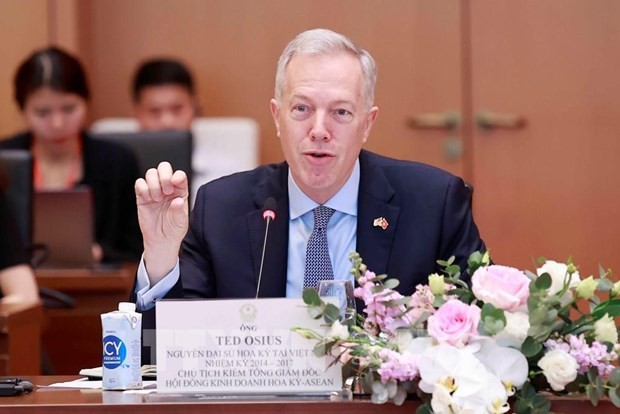 |
President and CEO Ted Osius (Photo: VNA) |
The delegation was led by the council's President and CEO Ted Osius who are on a working visit to Vietnam from March 21-23.
Duy said the Vietnamese Party and State consider sci-tech and innovation one of the strategic breakthroughs and a driving force of growth pace and quality, turning Vietnam into a modern industrialized nation by 2030 and a high-income and developed country by 2045.
In May and June last year, the Vietnamese Government and National Assembly passed a strategy on science, technology and innovation development till 2030 and the Law on amendments and supplements to several articles of the Intellectual Property Law.
These documents will open up increasingly favorable policy and legal corridors to promote the strong development of the innovation ecosystem and intellectual property ownership in Vietnam, contributing to creating a healthy business environment and delivery of commitments in trade agreements and international conventions to which Vietnam is a member, he said.
He added that the gap in science and technology between Vietnam and other countries in the region has significantly narrowed as Vietnam has made considerable progress in global competitiveness, innovation rankings and several of its strong science fields.
Since the signing of the Vietnam-US framework agreement on science and technology cooperation in 2000, their coordination in sci-tech and innovation has been launched in many areas within bilateral and US-ASEAN multilateral frameworks, he said.
Osius, for his part, pledged to continue assisting Vietnam in stepping up cooperation activities in science, technology and innovation within bilateral and US-ASEAN multilateral frameworks.
Representatives of the delegation shared issues related to sci-tech in various fields, including health care, transportation and information technology. They believed that in order to boost Vietnam’s exports to the world, it is necessary to develop deeper partnerships with the Vietnamese Government's laboratories such as QUACERT, QUATEST 1, 2, 3, and improve Vietnam's testing and certification capabilities.
The USABC promised to step up bilateral partnerships and believed that with mutual support, national laboratories can serve the global market and thereby turn Vietnam into an export hub in ASEAN.
They also wished to fortify cooperation with the Vietnamese Ministry of Science and Technology in fields of shared interest and strength.
























